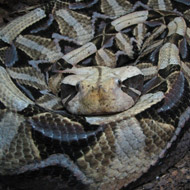World "facing crisis" as anti-venom runs out

An estimated five million people worldwide are bitten by snakes every year.
Tens thousands of people will continue to die of snakebite unnecessarily unless the global health community takes action to ensure that treatment and anti-venom are made available, an international medical organisation has warned.
Médecins Sans Frontières/Doctors Without Borders (MSF) say that the world is now facing a "real crisis" and that the global health community should accept their responsibility for neglecting the issue and take "immediate, appropriate and collaborative action".
Although a major killer, snakebite is one of the world's most neglected public health emergencies. An estimated five million people worldwide are bitten by snakes every year, of which 100,000 die and 400,000 are permanently disfigured or disabled.
In sub-saharan Africa alone, 30,000 people are killed by snakebite every year and an estimated 8,000 undergo amputations. It is predicted that this figure will soon rise, as existing stockpiles of one of the most effective anti-venoms for sub-saharan Africa are due to expire next June.
MSF snakebite medical advisor, Dr Gabriel Alcoba says: “We are now facing a real crisis so why do governments, pharmaceutical companies and global health bodies slither away when we need them most?
"Imagine how frightening it must be to be bitten by a snake - to feel the pain and venom spread through your body – knowing it may kill you and there is no treatment available or that you can’t afford to pay for it?”
Snakebite tends to mainly affect those living in rural areas. With no access to health facilities and unable to afford expensive treatment, many turn to traditional healers or don't seek care at all. MSF say that subsiding anti-venom costs so that patients pay little to nothing is "crucial" to improve access to this life saving treatment.
Fav-Afrique, produced by French pharmaceutical company Sanofi, is the only antivenom that has been proven safe and effective to treat envenoming from different types of snakes across sub-Saharan Africa. There are a few similar anti-venom products in the country, but their effectiveness and safety have not been properly established yet.
Production of Fav-Afrique was ceased in 2014 and the last batch will expire in June 2016. No replacement product will be available for at least another two years, translating into more needless deaths and disability.
Julien Potet, neglected diseases advisor for MSF’s Access Campaign, said: "Until a replacement product to Fav-Afrique is available, we hope that Sanofi can start to generate the base material needed to produce Fav-Afrique, and then find suitable opportunities within their production capacity to refine it into antivenom."
MSF adds that The World Health Organisation should lead the way in tackling snakebite as an issue, however they still consider it a "neglected condition with no formal programme," despite the high mortality levels.



 The BSAVA has opened submissions for the BSAVA Clinical Research Abstracts 2026.
The BSAVA has opened submissions for the BSAVA Clinical Research Abstracts 2026.